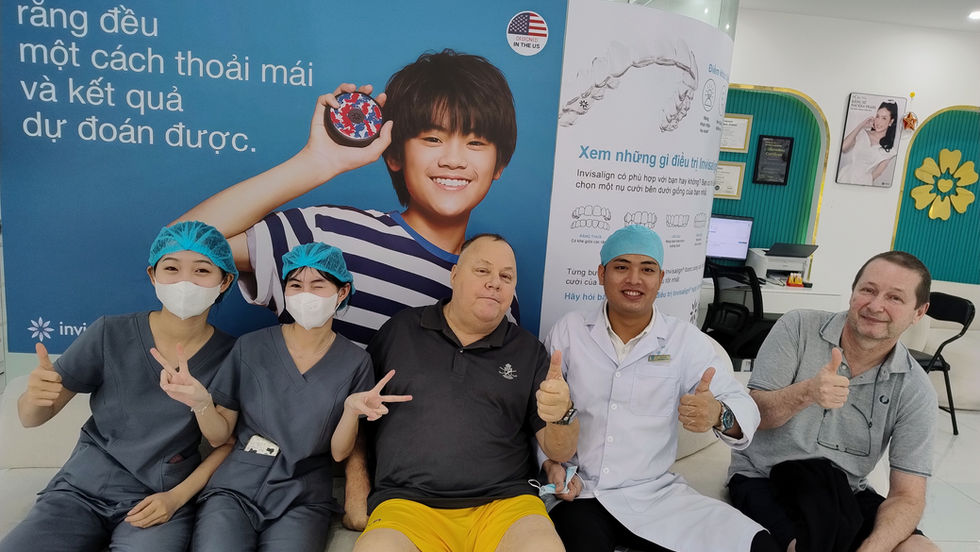Transplantation in a Foreign Country Like Thailand
- Mark F. Langenauer

- Dec 19, 2024
- 5 min read

Usually, when a person imagines a new life, you will have to come up with some cash for it. For those in organ failure, that price is sometimes unaffordable – both financially and emotionally. In the recent past, people were forced to seek a survival opportunity in another country through a subtotal of medical tourism that include organ transplantation. Thai sites: Thailand, an attractive and colorful country with beautiful seacoast, has become the focus of this multifaceted and frequently discussed practice. The appeal of receiving affordable and quality healthcare, great surgeons, and the opportunity to recover on the island has obvious rational and emotional perspectives but the choice of a transplant abroad is full of ethical questions and possible dangers that should be considered. The novices should not deny the difficulties embedded into this change, which is of such magnitude that it offers the possibility of a new start. This investigation of organ transplantation in Thailand aims at shedding light on both the glittering hope and the obscured hopelessness of what is fast emerging as the post humanistic medical modality.
Affordability
Let's talk about money. Because when it comes down to matters of life and death like in cases of organ transplantation the determining factor is most often money. In the real world of medical economy, organs for transplant-like kidneys in the US may go for as high as $400,000 a price that is prohibitive to most families. Cross the Pacific to Thailand however and that same procedure might be priced at $13,000. In my view, the gap is as vast as the Grand Canyon and all that separates the two worlds is despair for so many people. The same disparities exist for other major organs; despite less information available about the costs of liver and heart transplants in Thailand, the rumour among overseas patients is that costs are considerably lower than in the West. Canada’s $145,000 or even Britain’s $70,000 kidney transplant program suddenly does not sound as extremely expensive anymore. This shocking disparity can be attributed to this or that combination of causes. The affordable prices for products and services in Thailand, starting from food sold on the streets and ending up with hospital costs, enable a lower number of expenditures for operation. For example, the medical personnel are considered to be well-trained, yet they will be paid a lot less than some medical personnel in the developed countries in the West. Coming last is the currency exchange game, added advantage which makes the vitamin shop even more attractive to those patients from certain country. Lastly, most Thai hospitals provide irresistible ‘transplant tourism’ deals – the operation and multisensory experience for a fraction of what it would cost back home. Combined, they make quite the compelling concoction of offering an individual a life and an adventurous vacation. Is it actually doing wonders for one’s health, or is this just a product of some salesmen’s imagination and production? That is the question we need to analyze.
The Organ Supply: A Question of Ethics and Availability
This is where the murky waters begin to show to those who are trying to follow the construction of the narrative. Organ supply in Thailand is now a tug of war between optimism and the ugly truth. As regards the CdO, the nation has recorded appreciable improvement in OD rates, with an incremental trend in the number of deceased donors; however, the numbers are still quite poor. Picture the large, hollow ward in which the desperate attempts to grasping at the straws of a transplant are held. The grim reality is that organ donation registration among the Thai adult population is less than 1 percent, as compared to 37 percent of US and 33 percent of UK’s population. It generates an urgent need, generating an uncomfortable moral dilemma about where some of these needed organ transplants are coming from. Even though the Medical Council of Thailand and the Thai Red Cross Society follow the ethical standard in collecting and using the HPV samples, there are no sweeping laws comparable to Western style laws in Thailand that could create confusion and possibilities for girls and women to be exploited. It is a very subtle thin line that has to be comparable between the deceased and the living donors while at the same time carrying the risk of coercion especial in vulnerable groups. But even though tales of organ theft have been part of Thailand history, the government is striving to work on eradicating those ghosts of the past through policies and cooperation with other nations that may help in improving the legislation against the commerce in human organs. Therefore transparency which is another factor that people consider when looking for these services is still something of an issue making this type of service even more delicate.
Medical Marvels: Expertise and Cutting-Edge Care
But amidst these ethical complexities, there's an undeniable draw: It must be said that Thailand has a rapidly developing population of highly qualified transplant specialists. Most of the surgeons and physicians have experience from some of the top hospitals worldwide and have acquired internationally accredited certifications. Bangkok’s Bumrungrad International and Bangkok Hospital have been leading the way, their transplant programs sought after the world over. These are not old-fashioned, dilapidated structures; these are modern marvels of architecture, possessed with modern equipment, facilities equal to – if not better than – some facilities in the West. This commitment to advanced infrastructure enables complex procedures to be done to the extent of sophistication that would reassure anybody. And for those of you who think about what might happen in a different country’s healthcare system – do not worry. Most of the medical staff are actually bilingual and if they are not then translation services are available which means that there is no question of a language barrier throughout. Actually, most of the medical staff they talk English very fluently especially those in private hospitals. For any cosmetic surgery procedures to get through, the company will ensure that the patients go through a definite consultation and planning which is an inseparable part of the company’s overall operations.
A Crossroads of Hope and Complexity: Making the Right Choice
Thailand's allure as a medical tourism destination is undeniable: affordability, skilled professionals, cutting-edge facilities, and the promise of recuperation in a captivating cultural setting. But this enticing picture must be viewed through the lens of ethical responsibility and a clear-eyed assessment of potential risks. The decision to pursue an organ transplant abroad is deeply personal, a crossroads of hope and complexity. It's a journey that demands not only courage, but also meticulous research, careful consideration, and a willingness to grapple with the ethical dimensions of this life-altering choice. Before taking that first step, empower yourself with knowledge. Consult with medical professionals, explore reputable resources, and engage in thoughtful reflection. Your health, and your conscience, will thank you for it.
Ready to explore your options with clarity and confidence? Connect with us today for comprehensive resources and guidance on navigating the complexities of medical tourism.

_edited.png)































Comments